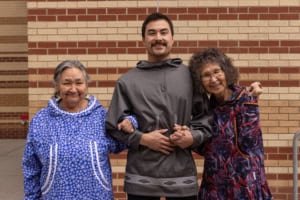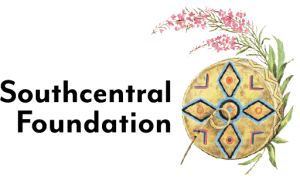Spotting Signs and Symptoms of Alzheimer’s Disease and Dementia in a Loved One
By Senior Marketing Specialist Lyla DeTavernier

Connect with your primary care team to learn how to reduce your risk of Alzheimer’s disease or dementia.
“My dad knew it was happening before I did,” Dustin Reynolds, a customer-owner from Anchorage shared. “He started taking notes and leaving himself reminders around his house. When the notes stopped helping him, I knew his illness was progressing through the stages of Alzheimer’s.”
June is Alzheimer’s and Brain Awareness Month and offers the opportunity to learn about prevention, signs, symptoms, and the critical role of early detection. Recognizing symptoms of dementia or Alzheimer’s disease in a loved one can feel scary. Your team at Southcentral Foundation is available to walk the journey with you.
Reynolds was the primary caregiver for his late father who was diagnosed with early onset Alzheimer’s at age 58. Alzheimer’s disease, the most common type of dementia, is a progressive condition impacting memory, thinking skills, and behavior. Dementia describes a wide range of cognitive deficits that affect the brain.
According to the Alzheimer’s Association of Alaska, Alzheimer’s disease affects around 12,500 Alaskans and is a top cause of death in the United States.
While forgetfulness is a natural part of aging, it should not affect daily life. Early signs of dementia and Alzheimer’s disease may include:
- Memory loss that affects daily life
- Difficulty performing normal tasks
- Difficulty with language
- Disorientation during the day
- Increase in poor judgment
- Sudden behavior or mood changes
- Changes in personality
If you are concerned a loved one may be showing signs of Alzheimer’s disease or dementia, a care conference with your primary care provider can be a helpful start.
“Early detection is essential. It is crucial for accessing treatment, planning for the future, improving quality of life, managing comorbid conditions, and receiving education and support,” SCF Medical Director Allison Critchlow said. “Primary care services at SCF can assist through screening and utilizing resources available on the Alaska Native Health Campus.”
Having these conversations helps customer-owners voice their medical wishes and share their values. This can be helpful if a customer-owner becomes unable to speak for themselves.
“There was no way to plan for what dad’s experience would be like, but we developed an advanced care directive early on,” Reynolds shared. “We knew there would be a point in time when he would not be able to make his own decisions and choices. Knowing his wishes and requests helped us make the best choices for him.”
While there is no cure for Alzheimer’s disease or dementia, lifestyle modifications can reduce the risk or delay onset.
“Customer-owners can reduce their risk for dementia by staying physically active, controlling chronic conditions including diabetes, high blood pressure, avoiding excessive alcohol use and smoking, preventing head injuries, and treating hearing loss,” Dr. Chris Piromalli, an SCF integrated palliative medicine physician shared.
Your family’s primary care team can connect you to resources throughout SCF that support brain health.
Reynolds reflected on his experience and offered encouragement to those in a caregiver role, “Remember it’s not your fault. Celebrate and remember the great days and times. Don’t let the painful and bad ones break you down and forget all the good parts.”
For questions, concerns, or to learn more about brain health, connect with your primary care team directly.
Sources: Alzalaska.org, Centers for Disease Control and Prevention.

